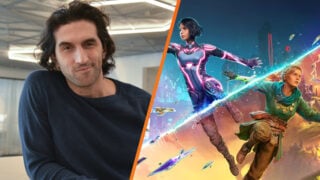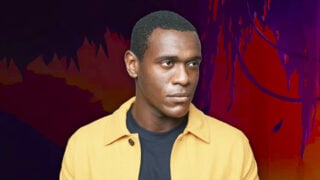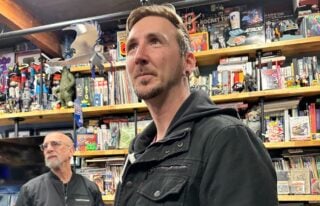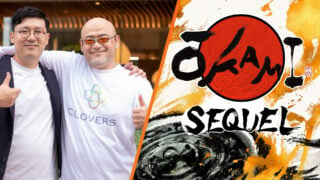Josef Fares’ last game sold 23 million, but he insists success hasn’t changed Split Fiction
The team behind It Takes Two is back, but can Hazelight recapture the magic that lead to massive sales?

Josef Fares holds court in any conversation, be it with the assembled journalists that have flown in from around the world to play his latest game Split Fiction, or his coterie of EA staff making sure he doesn’t go too far over the line. When Josef Fares speaks, people listen.
This is perhaps unsurprising from the developer who shot to fame following a now-legendary rant at The Game Awards. But categorizing Fares as a sweary headline machine would be entirely unfair. After all, he’d return to that same award show to pick up Game of the Year.
Watch our video interview with Josef Fares discussing Split Fiction:
It Takes Two was the game that dragged Hazelight from being popular among gamers to a genuine hit factory. The game, which Fares tells me has sold “almost like” 23 million copies, was a viral smash. It attracted people who had never picked up a controller, making the audience that will be looking for his next project far broader than before. I asked if that shift in audience had changed the way Hazelight approached Split Fiction.
“In a way yes, but no,” he replied. “Obviously, you see, it’s a Hazelight game, but we do what we want; we’re not doing this because they like that. Sometimes I say the game tells us where it wants to go. There is some stuff obviously, but if you listen too much and you’re too much like ‘what do people want’, you lose your own voice.”
After a few hours with the game, which consisted of a whistle-stop tour of several of its early levels, I was surprised by how much more difficult it felt than It Takes Two. I asked Fares about this, especially given the context that the game will likely attract non-traditional game players.
“It’s a little bit more difficult, that’s something else where we could adapt,” he replied. “Our games should be about progressing forward and following the narrative, so it’s challenging but not too hard.”
Split Fiction opens with two characters, Mio and Zoe, bumping into each other in the elevator of a publishing house. They couldn’t be more different, they’re chalk and cheese. It soon transpires that this publishing house was not in fact, a one-way ticket to authorial stardom, and was instead a nefarious content mine.
The publisher has developed a machine through which it can siphon the ideas of writers without having to pay them. Sounds familiar. I asked Fares what was behind this seemingly direct jab at the spectre of AI.
“It’s both scary and very exciting,” he said. “I believe at the end of the day, whatever new technology that comes, you should work with it and not against it.”
“If [AI is] part of the industry we should see how to implement it to see how we get better games. I can understand the fact that some people could lose their jobs but that goes for every new technology.”
While AI has been a factor in development for decades, the rise of (and public access to) generative AI has led many developers, actors and other creatives involved in the video game industry to warn of the potential risks. However, pleas from creatives have largely fallen on deaf ears in the C-suite.
Take-Two Interactive CEO Strauss Zelnick recently said that not only does he think AI won’t lead to job losses, he believes it could lead to increased employment. He also said that he couldn’t think of any new guardrails that might be required to protect developers.
“We need to adapt to it,” Fares continued. “If it’s part of the industry we should see how to implement it to see how we get better games. I can understand the fact that some people could lose their jobs but that goes for every new technology.

“Bad stuff and good stuff will come out of it. You can’t just close your eyes. I believe AI will have a bigger impact on the world than the internet had, eventually. It’s a long time until you can use it in an actual development, at least not at our place, maybe others can do it.”
“I’m hearing this is a subject that’s a bit sensitive,” Fares closes with a rye smile. I expect I’m not the first person to have asked him about gaming’s current big hot-button issue.
As is expected from Hazelight, Split Fiction is a game that must be played entirely in co-op. Like It Takes Two, players who purchase one copy of the game can play with a friend who doesn’t own the game. This friend pass was a key factor in spreading the game to so many players, and also cleverly navigates the potential issue of expecting players to fork out $120 before they can even play.
“As is expected from Hazelight, Split Fiction is a game that must be played entirely in co-op. Like It Takes Two, players who purchase one copy of the game can play with a friend who doesn’t own the game.”
Split Fiction’s levels are split between stages based on the fantasy stories of one of the characters, and the sci-fi world written by the other. These are visually distinct and offer a lot of variety. The conceit of every level being based on a story the characters wrote makes for a virtually endless scope of what a level could be.
For example, at one point I played a side story, which is an optional side level in the game, in which I took on the role of a pig that farted rainbows. This was apparently based on a story written by one of the girls when she was younger. Sadly, the story also involved the girl discovering how sausages were made, making for grizzly results.
The speed at which the game changes mechanics, settings, assets, and more reminded me of Team Asobi‘s Astro Bot. 2024’s Game of the Year sweeper was heralded for its willingness to adopt and drop mechanics at lightning speed. This was achieved by Asobi through rapid ideation and testing of mechanics. I asked Josef if Hazelight had adopted a similar approach.

“Let’s be honest here, this game is a little more complex (than Astro Bot) because of the fidelity. That was the hardest part, I loved Astro Bot, don’t get me wrong. We had a lot of ideas out there, but as long as they fit the story and go with the vision we go with them, but that is the hardest part of a Hazelight game.
“It’s easy to prototype mechanics, but to take them to this level of fidelity and polish, that’s the thing I’m most proud of for the team.” Josef tells me that 20-30% of ideas are left on the cutting room floor, which is staggering given the volume of mechanics we covered in this short portion of the game.
But in order to pull off this trick, players need to be able to know how to play with the mechanic very quickly. Any long tutorialising risks killing the momentum entirely, and when you’re not only balancing the momentum of one player’s experience, but two, this could be a lot of pressure. I asked how much time is spent on this aspect of the user’s experience.
“It’s easy to prototype mechanics, but to take them to this level of fidelity and polish, that’s the thing I’m most proud of for the team.”
“A lot,” Fares said, rolling his eyes, presumably recounting hours spent shortening tutorials by seconds. “Everything becomes harder when you do it in co-op. We do not want it to be a co-op when you’re just shooting, we want ‘you do this, I do that, you do this, I do that’. We have moments where you do the same thing, but most of the time it’s my mechanic and your mechanic.”
While I’m certainly sold more on Split Fiction mechanically than I was by It Takes Two, the game’s writing remains an unknown. Hazelight games have to walk an unfortunate tightrope of knowing that any and all narrative depth will be accompanied by whoever you’re playing with eating their dinner or stopping to go to the loo.
But considering Split Fiction’s premise and license to do whatever it wants and explore any fantastical world it pleases, we’re sure it’s a challenge they’ll handily beat.
Split Fiction is scheduled for release on March 6 for PS5, Xbox Series X/S and PC.























